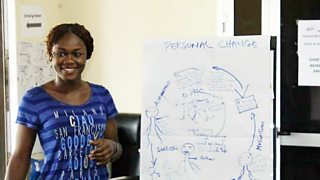How can media and communication improve your health?
Emebet Wuhib-Mutungi
Health Adviser
Tagged with:
‘When have you taken steps to improve your health as a result of something you read or heard in the media or talking to someone?’ asks an activity in a Ö÷²¥´óÐã Media Action health workshop exploring the complexities of behaviour change. Delegates were asked to reflect first on their own personal experiences of behaviour change before they started to think about how to influence others.
The Ö÷²¥´óÐã Media Action workshop – designed to help people harness communication to help people become more healthy – challenged participants to think about something they wanted to start or stop doing to improve their health. I had to reflect on what had made things difficult, what motivated me, the influence of media and communication and describe in pictures, my journey of change. My goal sounds simple enough. To start exercising again.
But as I’ve found through running the same workshop with Ö÷²¥´óÐã Media Action colleagues and partners in Africa, Asia and London the hurdles are common. Lack of time. Lack of support. Or simply a lack of belief that we can actually make the change and do something. We all know that exercise is good, but knowing and understanding is not enough to drive change.
In some countries it just isn’t common to talk about issues that are considered private or personal, and customs – and family ‘rules’ - can be hard to influence. Maraya is an assistant radio producer in Sierra Leone, who took part in a workshop I ran. She gave an example that illustrates that change is a process and supportive media and communication can be critical, reinforcing healthier behaviours by modelling them.

Maraya, sharing her story at a Pulse workshop in Freetown, Sierra Leone
“As a young person living with my family, and the eldest child, it wasn’t acceptable to ask parents questions. But I moved to Nigeria to study and lived with a family who talked openly about health. When they saw that I was taking 4 or 5 lumps of sugar in my tea or porridge, they inspired me to make a change. I started having only two lumps a day like them. It was hard at first, because I didn’t like the change of taste. But I got used to it and was feeling happy that I was doing something to improve my health. When I returned to Sierra Leone I shared what I had learnt with my family, but they didn’t see why they should change.”
But then, something happened that made her and her family sit up and take notice.
“When my mother was diagnosed with diabetes, and I saw the effect it had on my mother’s life; this gave me the confidence to talk to my family again. At the same time, there was a weekly health TV show that was focusing on diabetes and we started to watch it as a family. It had a health expert and featured real life stories. This had a real impact on my family, as well as all the hospital bills we had to pay.”
It can be both emotional and inspiring to hear people like Maraya describe their journeys of change in workshops, with their ups and downs, their difficulties and successes. It’s especially inspiring when these workshops take place in countries where personal health isn’t discussed openly and health systems are weak.
These ‘personal journeys of change’ workshop sessions are the most memorable for participants, because they often turn into ‘group help’ sessions, with people offering each other advice around how to reach their goals. This can itself motivate change or help heal emotional wounds.
By sharing personal experiences, we get a deeper understanding of how behaviour change happens. And this is an important step for thinking about and planning how to use media and communication to enable people to change not only their own health for the better, but to positively influence the wider community – and society – too.
For guidelines for running your own behaviour change workshop, as well as resources designed to help you create effective health communication projects, .
Related links
Follow us on , and
